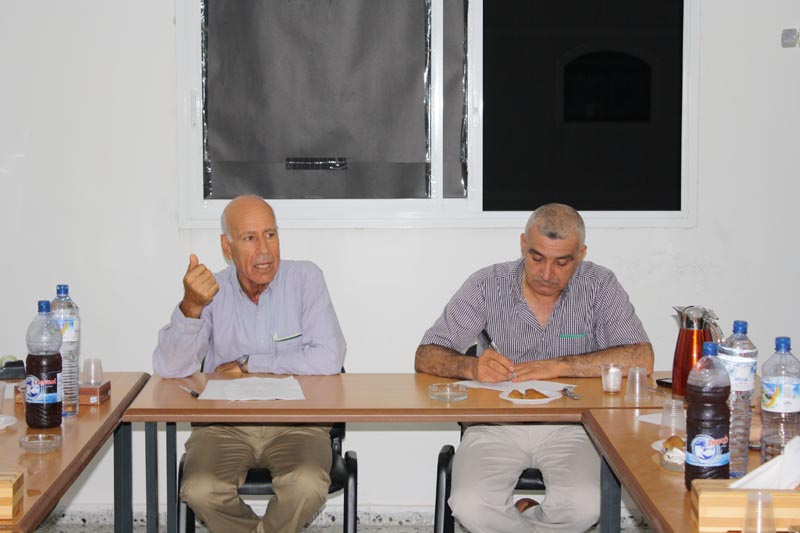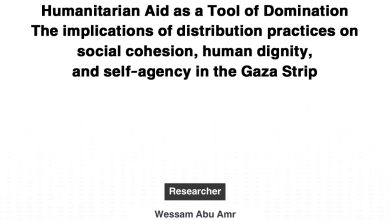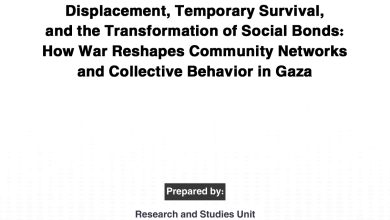New Release Analysis paper: Understanding the Ongoing Israeli Political Atmosphere

Palestinian author, writer, and acquainted with Israeli affairs.
In several countries, ideologies play a significant role in shaping the internal and foreign policy of the country. It is not only policies that are affected by ideologies, it the whole society along with all its components..
When it comes to understand Israel and its political situation, an understanding should not be built on the same way of understanding the Arab political systems. For this reason, several points related to the Arab understanding of politics should be avoided:
1. In the Arab world, the policy of the state is directed personally by the leading man of the country whether he is a president or a king.
2. Ministries and public organizations are ruled by political parties which determine the political, economic, cultural, and social orientations.
3. The interest of the country is connected strongly with commercial interests.
4. The country is strongly affected by its neighboring countries.
5. The country’s policy is strongly shaped basing on international agendas.
On the other hand, Israel might differ from its neighboring Arab countries due to reasons associated with its social, religious, and cultural structure. Occasionally the use of religion in various aspects reflects the adoption of religion as an ideology that directs the Israeli policy.
The current Israeli policy is affected mainly by four basic influential factors:
1. Internal ideology: As mentioned above, the internal ideology plays an important role in shaping the Israeli policy. To touch on this fact, such ideological intervention can be reflected through reviewing famous names of Israeli ministers who serve in the current right-winged government:
o The first ministry is the ministry of interior affairs administered by Eli Yishai who is a member of Shas, the Sephardic and Mizrahi Haredi party. Yishai is one of Rabbi Ovadia Yosef students .
o The second ministry is the ministry of education. The minister is Gedon Saer from Likud Party. Saer strongly adopts the original Zionist principles
o Ya’akov Ne’eman is third minister. He is the minister of Justice where his ministry keeps covering the practices of the ministry of internal affairs against non-Jewish citizens. Ne’eman’s ministry keeps issuing laws that ensure a pure Jewish Israel.
o The fourth minister is famous and well-known. Ehud Barak, the minister of defense who represents the connection between the secular aspect of Israel and its Haridi fundamentalist aspect.
2. The Jewish Lobbies: The Jewish lobby in the United States of America plays an important supporter for Israel’s policy. It also contributes in shaping and formulating the US policies to serve Israel. This lobby is dedicating all his abilities and powers to assist Israel.
3. The economic power: This means Israel’s national income as well as imports and exports. For example, Israel is pioneer in military manufacturing and marketing fields. For this reason, Israel gives the economic factors high considerations more than the political ones.
4. The forth influential factor is Israel’s military capabilities which give it the superiority in the Middle East. Israel was and still the state of generals. Most of Israel’s leaders are military men as in the case of political parties, associations and institutions.
Adding to these four influential factors, there are a lot of secondary factors that contribute to the shaping of Israel’s policy. The top of them is the Palestinian affection. The Palestinian factor does not have strong impacts of Israel’s policy. But this does not mean that it is affectless. In other words, Israel benefits from the Palestinian weakness which returns to:
§ Flabbiness of the Palestinian political system where every political party act and reacts basing on the interest of the party itself.
§ Lack of Palestinian parties’ political influence on the overall Palestinian domain. This is because of occupation, blockade policies, and isolation. And the main reason is the absence of political participation concepts.
§ The Palestinian political division between Fatah and Hamas.
§ The inability of Palestinian parties to agree on forming the Palestinian objectives basing on a national program has been agreed upon through democratic processes.
Based on what mentioned, Israel will keep seeing the Palestinian party as a negotiator who seeks signing an agreement to end the conflict. In general, Israel still does not recognize the Palestinian side as a rival who face Israel political through this negotiation.
Israel is using the negotiations as a bridge to facilitate normalization with the Arab world. This normalization serves Israel’s aims of being a central state in the Middle East.
The general view towards Israel nowadays gives us evidence that the mainstream in Israel is towards more radicalism. The fundamentalist mainstream can be observed on several levels in the Israeli society..




